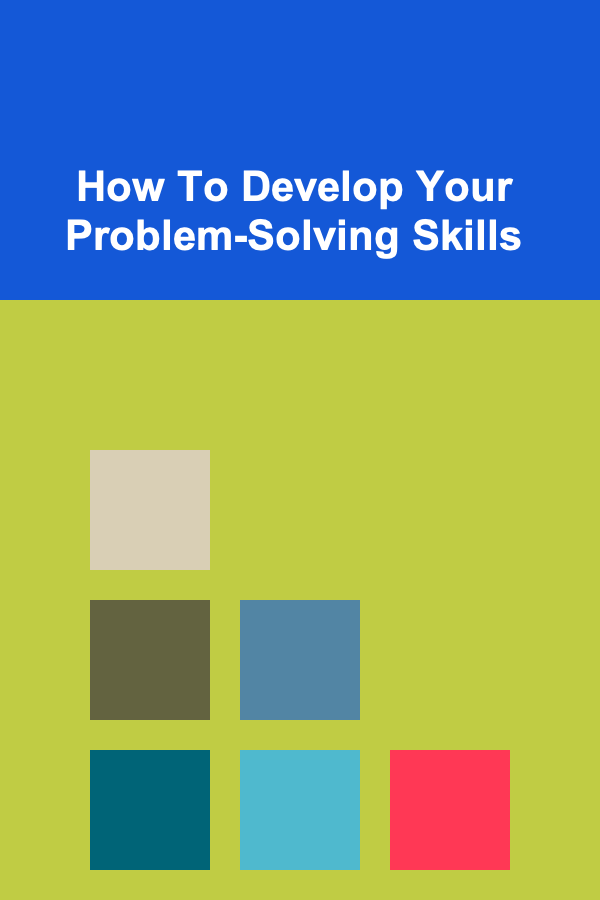
How To Develop Your Problem-Solving Skills
ebook include PDF & Audio bundle (Micro Guide)
$12.99$9.99
Limited Time Offer! Order within the next:

Problem-solving is one of the most important skills you can possess, both in your personal and professional life. It allows you to navigate the complexities of life, face challenges, and create solutions that are efficient and effective. However, like any other skill, problem-solving needs to be developed over time. It's not something that happens automatically. To be a successful problem-solver, you need to be able to think critically, assess situations, analyze data, and come up with creative solutions.
In this article, we'll explore several strategies to help you develop your problem-solving skills. By adopting a problem-solving mindset and applying specific techniques, you can improve your ability to tackle challenges in various areas of life.
Understanding the Problem-Solving Process
Before diving into specific strategies, it's important to understand the problem-solving process. This is the framework that guides individuals from identifying a problem to finding a solution.
The typical problem-solving process includes the following steps:
1. Identify the Problem
The first step in solving any problem is to clearly understand what the problem is. Often, people rush into solutions without fully grasping the problem, which leads to ineffective or misdirected efforts.
2. Define the Problem
Once you've identified the problem, it's crucial to define it. This means breaking the issue down into its core components. Ask yourself questions like:
- What exactly is the problem?
- Who is affected by the problem?
- What are the underlying causes of the problem?
By defining the problem clearly, you'll be in a better position to come up with an appropriate solution.
3. Gather Information
Before jumping to conclusions or solutions, gather all the relevant information. This may involve researching, asking questions, or analyzing data. Having a well-rounded understanding of the problem and the context surrounding it is crucial for making informed decisions.
4. Generate Possible Solutions
Once you have all the information, it's time to start brainstorming solutions. Don't settle for the first idea that comes to mind. Think creatively, and consider multiple alternatives. The more options you have, the more likely you are to find an effective solution.
5. Evaluate and Select the Best Solution
After generating potential solutions, it's time to evaluate them. Ask yourself which solution is the most viable. Consider factors like:
- Is the solution realistic?
- What are the risks associated with each option?
- What resources are required to implement the solution?
Choosing the best solution requires critical thinking and judgment.
6. Implement the Solution
Now that you've selected the most suitable solution, it's time to implement it. Create an action plan, set timelines, and identify necessary resources. Effective implementation requires discipline, focus, and commitment.
7. Monitor and Review
After the solution has been implemented, it's important to monitor its progress. Is it working as expected? Are there any unforeseen obstacles? If necessary, make adjustments. Reviewing the process after completion helps ensure that the solution has effectively solved the problem.
Strategies to Develop Your Problem-Solving Skills
Now that we understand the problem-solving process, let's look at specific strategies you can use to improve your skills.
1. Cultivate a Problem-Solving Mindset
A mindset is the lens through which we view the world. To become a better problem-solver, it's crucial to adopt a problem-solving mindset. This means seeing challenges as opportunities rather than obstacles. When you approach a problem with curiosity, rather than frustration, you are more likely to find creative solutions.
A positive, proactive attitude will help you maintain persistence, even when solutions seem elusive.
2. Practice Critical Thinking
Critical thinking is the ability to analyze and evaluate information objectively. It is essential for problem-solving because it enables you to identify key issues, challenge assumptions, and approach problems from different angles. Here are a few ways to enhance your critical thinking:
- Question assumptions: Don't take things at face value. Ask yourself why things are the way they are, and consider alternative explanations.
- Evaluate evidence: Gather all relevant information and assess its validity. Are the facts you have reliable?
- Consider implications: Think through the possible consequences of each solution.
By practicing critical thinking, you develop the ability to assess situations more accurately and identify solutions that are grounded in logic.
3. Break Problems Down
Large problems can be overwhelming. When faced with a big challenge, it's easy to become paralyzed by the complexity. To overcome this, break the problem down into smaller, more manageable parts. By focusing on one component at a time, you'll be able to tackle the issue systematically and make the overall process more manageable.
This is a common technique used in project management and engineering, called "divide and conquer." By addressing each piece individually, you can find solutions step by step.
4. Improve Your Decision-Making Skills
Effective problem-solving often involves making decisions with limited information. To become a better problem-solver, you need to improve your decision-making abilities. Here are some tips:
- Use data and evidence: Make sure that your decisions are based on facts, not emotions or assumptions.
- Weigh the pros and cons: Consider the benefits and risks of each possible decision.
- Trust your intuition: While data is important, intuition can also play a role, especially in situations where time is limited.
The more decisions you make, the better you'll become at evaluating the best options.
5. Think Creatively
Creative thinking is crucial for finding innovative solutions. Sometimes, the best solutions aren't obvious, and you need to think outside the box. Here are some ways to enhance your creative thinking:
- Brainstorming: Write down as many possible solutions as you can, without filtering or judging them. You can narrow down your ideas later.
- Change your perspective: Try looking at the problem from a different angle. Ask yourself how someone else might approach the issue.
- Challenge norms: Don't be afraid to challenge conventional wisdom. Sometimes the best solutions come from challenging the status quo.
Creativity is a muscle that improves with practice. The more you flex your creative muscles, the better you'll get at thinking outside the box.
6. Learn from Your Mistakes
Failure is an inevitable part of problem-solving. Not every solution will work, and not every decision will lead to success. However, the key to becoming a better problem-solver is learning from your mistakes. After each setback, reflect on what went wrong:
- What could I have done differently?
- What did I learn from this experience?
- How can I apply this lesson in the future?
By viewing failures as opportunities for growth, you'll develop resilience and the ability to improve your problem-solving skills over time.
7. Collaborate with Others
Some problems require teamwork. Collaborating with others can expose you to different viewpoints and ideas, making it easier to find effective solutions. By working in a group, you can leverage the strengths and expertise of others, which can lead to more innovative solutions.
Here's how to make the most out of collaboration:
- Share your thoughts: Don't hesitate to share your ideas, even if they seem incomplete.
- Listen actively: Pay attention to what others have to say, as they may offer valuable insights.
- Delegate effectively: Know when to let others take charge of tasks that are better suited to their skill set.
Teamwork can make problem-solving more efficient and less stressful. The diversity of ideas and perspectives often results in more creative and effective solutions.
8. Stay Organized
When tackling complex problems, staying organized is key. Keep track of your ideas, research, and plans to ensure that you don't lose sight of important details. Use tools such as to-do lists, mind maps, or project management software to help you stay organized throughout the problem-solving process.
Being organized will not only help you stay on track but will also enable you to execute solutions more effectively.
9. Practice Problem-Solving Regularly
Like any skill, problem-solving improves with practice. Look for opportunities to solve problems in your daily life. Whether it's figuring out how to save time in your routine or addressing a workplace challenge, actively seek out problems to solve.
By regularly practicing problem-solving, you'll develop a deeper understanding of the process and improve your ability to handle challenges more efficiently.
Conclusion
Problem-solving is a vital skill that plays a role in almost every aspect of life. Whether in your career, personal life, or relationships, being able to solve problems effectively will make you more successful, confident, and resilient.
By adopting a problem-solving mindset, practicing critical thinking, learning from mistakes, and collaborating with others, you can significantly improve your problem-solving abilities. Remember that problem-solving is a skill that can be honed over time, so be patient with yourself and practice regularly. With dedication and the right strategies, you can become a more effective and creative problem-solver.

How to Budget for Home Renovations Without Going Overboard
Read More
How to Select Outdoor Lighting for Curb Appeal
Read More
Ultimate Guide to Utilizing Public Wi-Fi for Internet Access While Traveling
Read More
How to Navigate the World of True Crime Documentaries
Read More
How to Navigate Customs Regulations in Emerging Markets
Read More10 Tips for Remote Workers: Tracking Home Office Expenses for Taxes
Read MoreOther Products

How to Budget for Home Renovations Without Going Overboard
Read More
How to Select Outdoor Lighting for Curb Appeal
Read More
Ultimate Guide to Utilizing Public Wi-Fi for Internet Access While Traveling
Read More
How to Navigate the World of True Crime Documentaries
Read More